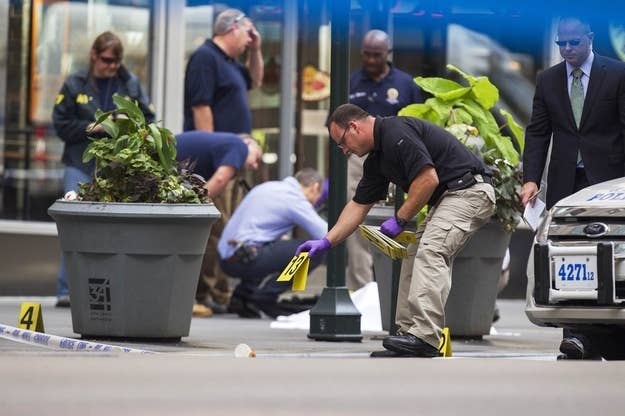
It's a sad day when The Onion has to amend its darkly funny headline, "Nation Celebrates Full Week Without Deadly Mass Shooting," with the less-funny update "Never Mind." This morning's shooting at the Empire State Building is the latest in a string of such mass attacks that have made mourning the sudden death or injury of large numbers of innocent people feel like the nation's new normal. Homicide in general has been declining across much of the US for over twenty years, but average Americans can certainly be forgiven for wondering if they're more at risk than ever of being gunned down by a stranger on a rampage.
That question turns out to be somewhat hard to answer. Jens Ludwig, crime expert and coauthor of Gun Violence: The Real Costs says it's hard to tell if shootings like the one at the Empire State Building are becoming more common: "these mass shootings are far too frequent from a public safety perspective but still pretty rare and idiosyncratic from a statistical perspective." Criminologist James Alan Fox has written that, according to FBI data, mass shootings have fluctuated since 1980 with no sustained upward or downward trend. "Occasionally," he writes, "we have witnessed short-term spikes with several shootings clustering close together in time." The Empire State Building shooting, preceded by the shootings at the Sikh temple in Oak Creek, Wisconsin and the movie theater in Aurora, Colorado certainly seem like part of a spike.
Fox's data also stops at 2010, and a spokesperson for the FBI says it has no crime data available yet for 2012. So it's hard to tell how this seemingly very violent summer compares to previous years. Philip J. Cook, crime scholar and Ludwig's coauthor on Gun Violence thinks we may be in the midst of a spike — in terms of number of people killed in mass shootings, he says, "it does seem like this is an extraordinary period."
He says it's very possible that some of this year's mass murderers have been inspired by earlier shooters, which would make the abundance of incidents more than a coincidence — he notes that at least some of the rash of school shootings in the '90s appeared to be copycat crimes. Fox, too, sees copycatting as a possible cause of spikes in the mass shooting rate.
Cook also believes adversarial political rhetoric is a possible contributing factor. He criticizes the NRA for "promoting the idea that Obama's goal is to take away guns and they have to fight to prevent that from happening," an idea he says has stirred up fringe gun enthusiasts and led to record-breaking rises in gun purchases and concealed-weapon applications in many states. In fact, he says, the only gun law Obama has signed has been one allowing concealed weapons in national parks.
To prevent future mass shootings, Cook calls for a reinstatement of bans on assault weapons and magazines holding more than ten rounds of ammunition. Ludwig agrees that a ban on high-capacity magazines is advisable.
If the pattern Fox identified continues, then this summer's spike — if it is indeed one — should be followed by a drop. But with 250 to 300 million guns already in American hands, public health and safety services getting cut on state and local levels, and federal politicians expressing no interest in toughening gun laws, it wouldn't be surprising if that drop never arrives.
